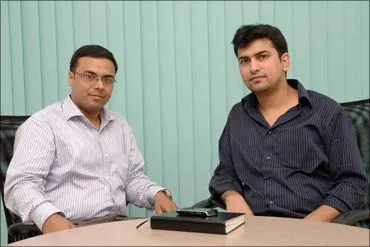Uniphore- Providing Speech Based Mobility Solutions

Ravi Saraogi and Umesh Sachdev launched their first startup, Singularis Technologies six years ago. They thought they'd figured out the largest gap in the rapidly growing telecom industry: lost phones! But future had something else in store. In an effort to create a Fortune 500 company out of a few lines of code, they met many stakeholders, analysts and gurus in the telecom industry to get their guidance. One such person was Professor Ashok Jhunjhunwala of IIT Madras, a famed board member of many illustrious corporates in the country. He offered to mentor them personally, if they agreed to move to his Business Incubator at IIT Madras, which was supporting and building startups with rural relevance. This was Ravi and Umesh’s introduction to IIT-M’s RTBI (Rural Technology and Business Incubator) where they saw the opportunity to use their understanding and passion of mobile technologies to solve a larger problem: access to content and services for the vast semi-literate and illiterate Indian population.After many months of field research, Uniphore’s founders concluded that people would like the use their mobile phone in the same way that people today use the internet – as a medium for accessing information and services conveniently, and in a way that is personalized to their queries. Also, people must be able to access such information in their own local languages. The only way that such information could be delivered to all people across the socioeconomic period is through voice.
With these conclusions, the founders embarked on an exciting journey to create Mobile VAS products using vernacular Speech Recognition and Voice Biometrics. It took them 12 months of prototyping in the lab, a tie-up with the global leader in speech technologies, guidance and validation from multiple academicians, seed level funding from an institutional investor, and hands-on mentoring by serial entrepreneurs, to create what has now become Uniphore Software Systems. Launched in 2008, Uniphore creates applications that enable enterprises to expand their customer base to remote areas and enhance their service delivery by offering secure, personalized information and transactions to customers in their local languages on any low-end mobile phone.

We interviewed the co-founders to see how Uniphore progressed in the last 4 years. Here’s what they had to say:
Uniphore primarily focuses on banking and agriculture, but you’re also building competency in healthcare, education and retail. Tell me about the role of speech in each of these verticals.
In case of Banking, Uniphore enables an affordable, voice-based mBanking system. Customers can call the system and authenticate their identity through Voice Biometrics. Then, using Speech Recognition, the system engages the user in an interactive conversation to process the requested transaction. Using our technology, financial companies and m-commerce providers can provide their services in local language options, and integrate them with follow-up systems through voice and SMS alerts.
With Agriculture, we work with contract farming companies, agriculture extension service providers and input businesses. Combining IVR with SMS and GRPS technologies, we enable agriculture business to deliver customized information to farmers through pre-scheduled voice and SMS announcements. Furthermore, farmers can instantly access information related to the business at all times through multilingual speech recognition system.
With Retail and FMCG, we give manufacturers the capability to capture and deliver real-time information about retail processes. Customized GPRS and SMS applications enable businesses to share voice and text content amongst the various parts of their distribution chain. In Education, we enable Governments and education companies to use the mobile phone as an effective medium for teaching and training. In Healthcare, our speech-based technologies enable Governments and healthcare companies to provide efficient, accessible and personalized healthcare services across the country through applications.
What kind of potential do you see with speech based-mobile systems?
We think that speech-based mobile applications complete the enterprise mobility revolution occurring in India today. Using only GPRS or SMS often excludes people with low-end phones, as well as those with literacy and language constraints. But a voice application works on any mobile phone, letting companies connect with customers and conduct business 24 X 7, online or offline, and in any language. Hence, adding voice to other mobility tools lets businesses capitalize on the all the capabilities of the mobile phone, and guarantees that there will be no limitation to their mobility.
From all the projects that you’ve undertaken in various fields, which one has helped you to evolve the most?
Our work with Basix Sub-K in financial inclusion has been amongst the most rewarding solutions we have developed, but also the most challenging. The software requirements for banking solutions are very robust, and voice biometrics and speech recognition must be available in many languages and dialects so that the solution can be deployed pan-India. Beyond that, the challenge lies in the number or parties with whom we have to collaborate for the solution to be totally successful. In addition to working with Sub-K, we have to work with the banks to integrate our application with their core banking systems. We need to engage the telecom companies, to make sure we can provide last mile reach. Finally, we have to work with the banking agents in the village, to help train them on the technology. Only when all these players were aligned and satisfied could we launch the solution effectively.
How does Uniphore make money?
We know that not every business can afford the hardware and software involved in voice-based mobility solutions. So to make our offerings more customer friendly, Uniphore offers a pay as you go, transaction-linked pricing – and most of our solutions are hosted on the cloud.
A tremendous amount of effort has gone in to build Unipore’s core competencies to deliver high-class solutions. But your solutions are innovative and very new to the average Indian consumer. So how do you market Uniphore?
This week, we just launched our new brand identity with the release of our new logo and website. Through our progress and achievements over the last few years, we have learned that successful mobility comes from solutions that capitalize on all the capabilities of the mobile phone – speech, SMS, and GRPS. These mobile applications enable businesses to securely connect with customers and conduct business across geographies, 24x7, and in any language.
What are the challenges that you face?
Because speech technology is relatively new, sometimes we face challenges in end user adoption, particularly in very low-tech populations. For this reason, we have recently been sharply focused on developing strategies to enable swift adoption of technology amongst end users. This involves deploying staff to the field to train our business partners and end users on how to use technology for optimal results as well as enhancing the design of the solutions and call-flow, given inputs in the field. We’re learning every day, and moving towards a seamless deployment of our solutions.
Website: www.uniphore.com







